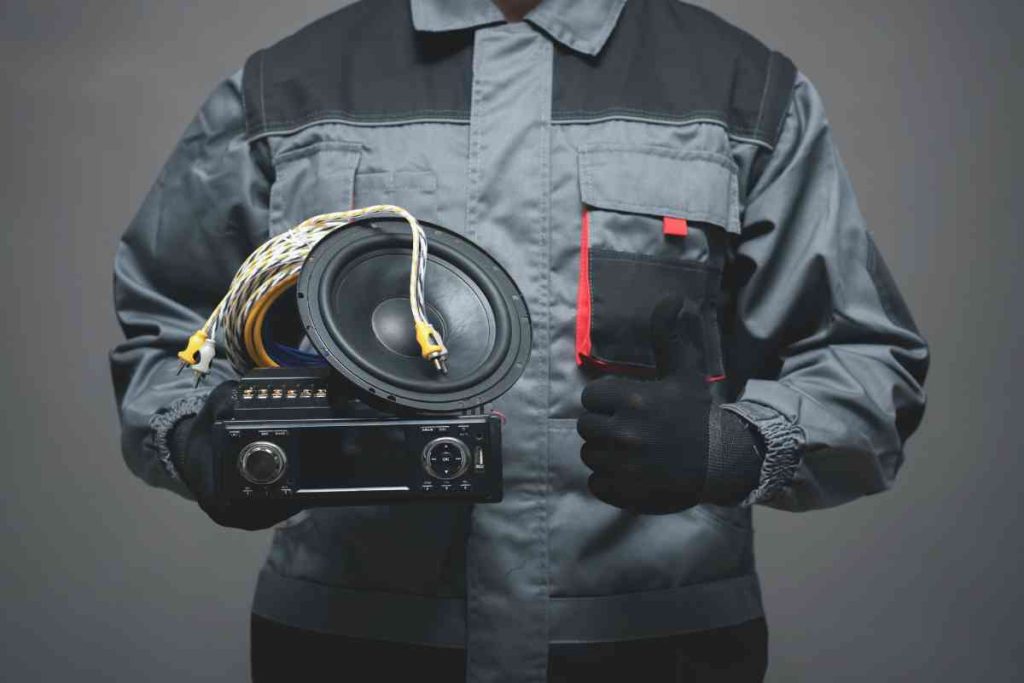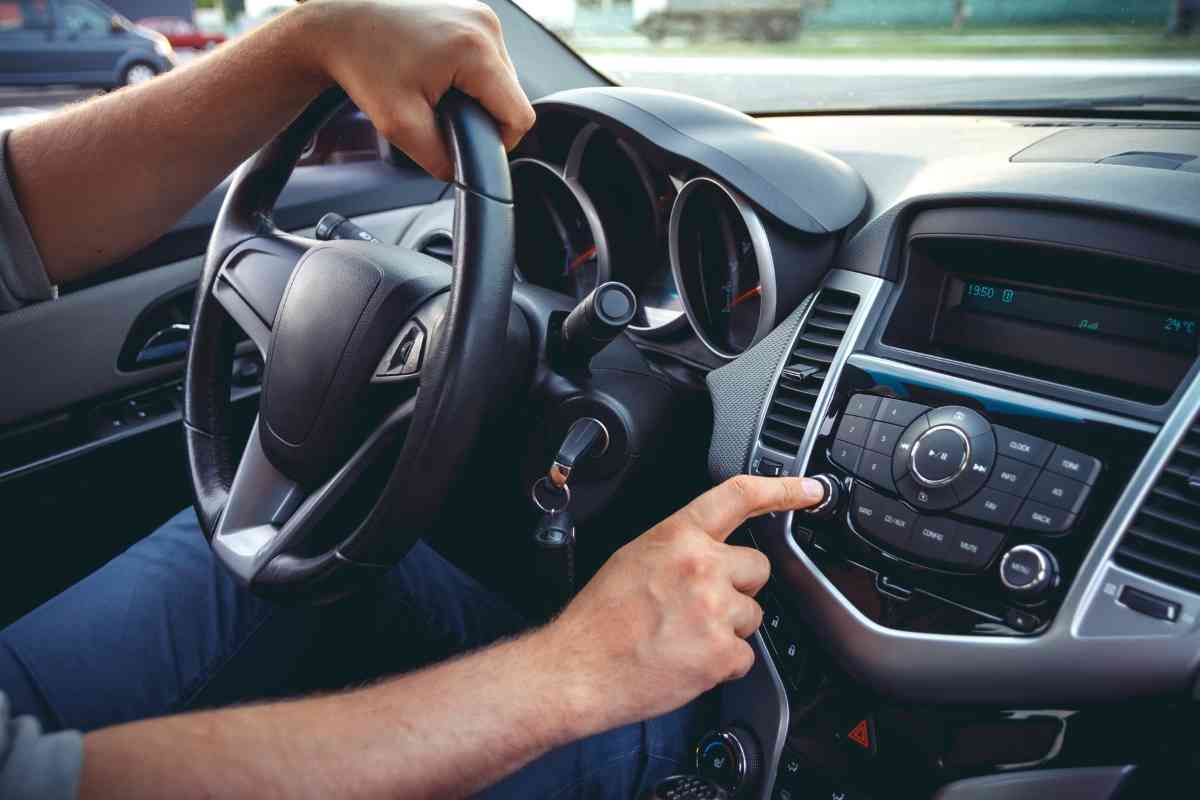If you’re considering upgrading your car stereo, it’s possible to install a new one. The market offers multiple options to choose from. And these options vary in quality as well.
By undertaking a straightforward car stereo installation, you can enhance the sound quality and fully appreciate the latest tunes.
Opting to upgrade your car’s audio system could increase your car’s value. It also enhances your overall driving experience. A high-quality audio system truly complements a great car.
However, what expenses can you anticipate for a car stereo installation, and which components will you require? This article answers the question, how much does it cost to install a car stereo? Read on to find the answer.
How Much Does It Cost to Install a Car Stereo?
The average cost of installing a car stereo ranges from approximately $40 to $100. However, if you prefer more advanced features or a customized arrangement, the cost can rise to $200 or beyond.
The installation cost can be influenced by the make and model of your vehicle, as some are more straightforward to work with.
Estimated Costs (Minimum to Maximum):
- Car Stereo: $100 to $1200
- Labor Cost: $40 to $100
- Dash kit: $12 to $45
- Wiring harnesses: $7 to $25
- Antenna adapters: $10 to $30
- Total cost: $169 to $1400
While attempting a DIY installation may seem like a way to save money, it is advisable to rely on professionals unless you possess prior experience with car stereo systems.
Skilled technicians ensure swift and efficient completion of the task and guarantee proper connectivity and functionality.
Ultimately, the cost of installing a car stereo depends on your specific requirements and preferences.
By considering the information mentioned above, you can gain a general understanding of the anticipated expenses when planning for this undertaking.
Factors That Influence the Cost of Car Stereo Installation
The following are factors capable of affecting the cost of your car stereo installation:
1. Vehicle Type
Contrary to popular belief, installing a car stereo does not follow a uniform pattern across all vehicles. Certain vehicles present more significant challenges when incorporating electronic components, consequently contributing to increased expenses.
Requesting a comprehensive upfront estimate from the installer to be well-informed about the impending costs is advisable.
If disassembling the dashboard or repositioning components becomes necessary to facilitate proper wiring placement, the resulting bill is expected to be higher.
Another potential issue arises from the fragility of certain parts in older vehicles due to prolonged exposure to UV radiation and wear.
An additional financial burden is incurred if any components break during the stereo installation.
2. Type of Equipment Used
When merely exchanging the head unit for a comparable model, the installation process can be completed swiftly, reducing costs.
Conversely, the labor expenses will escalate significantly if you intend to comprehensively overhaul the entire audio system, including acquiring brand-new equipment.
Additional services, such as installing sound-dampening materials or rerouting wiring to a different location, can further extend the installation duration.
Moreover, opting for cutting-edge equipment entails an additional layer of complexity. For instance, extensive configuration is imperative if you intend to incorporate a navigation system.
The time required by a professional installer to accomplish this customization must be considered.
3. Where it is Installed
The choice of installation service provider significantly influences the price. Opting for a casual arrangement, such as engaging the services of your brother’s neighbor, may result in a satisfactory outcome for a nominal payment. However, engaging a certified professional inevitably incurs higher costs.
Within the realm of professional stereo installers, multiple alternatives exist. Specialized car electronics establishments offer services at comparatively elevated rates.
However, in return for the associated expense, you gain access to a team of experts capable of handling intricate installations.
An alternative approach may involve inquiring about pricing at a local Walmart store for more detailed installation requirements.
Many locations offer installation services for a car stereo head unit, with prices as low as $65 when purchasing the radio from the retailer.
How Long Does It Take to Install a Car Stereo

The process should typically be accomplished within an hour when installing a head unit.
The only circumstance that might prolong the installation duration is if the new head unit is incompatible with the existing slot.
The installation cost may increase if accessing the dashboard to remove the old head unit proves challenging. In most head unit swap scenarios, you can conveniently wait for your car at the installer’s location.
However, if you desire a comprehensive system configuration tailored to your auditory preferences, be prepared to relinquish your vehicle for several hours.
Even with a team of skilled professionals working diligently, completing the task may take four to eight hours. Additional time is necessary if supplementary services like sound-dampening installation are required.
Items Needed for Your Car Stereo Installation
The following are items that make up the car stereo:
1. Amplifiers
Incorporating an amplifier becomes a crucial consideration if you intend to enhance the speaker system. Amplifiers effectively manage electrical power and direct it to the appropriate destinations.
Amplifiers are particularly advantageous when operating high-performance speakers or a subwoofer. However, the electrical demand may necessitate the installation of an additional dedicated car battery.
The appropriate amplifier size selection hinges upon the specific equipment you wish to integrate into the system.
2. Receiver
The central component of the car audio system is the receiver, and acquiring a worthwhile one ensures a gratifying experience.
Considering the perpetual evolution of technology, selecting a receiver that aligns with your specific requirements is imperative.
Many contemporary receivers boast touchscreen interfaces, facilitating seamless radio station switching and volume adjustment.
These visually appealing touch screens often offer Bluetooth connectivity, enabling compatibility with Android and Apple Play devices.
Undeniably, these advanced features come at a cost, and acquiring a high-quality receiver may amount to approximately $1000, depending on the desired functionalities.
A more budget-friendly option, priced around $400, may suffice if your objective primarily involves basic connectivity or the playback of traditional CDs.
It is crucial to note that the saying “you get what you pay for” holds in this context. Higher-priced receivers undeniably offer a more extensive array of features compared to their cheaper counterparts.
3. Wire Harness
Given the substantial power coursing through the car audio system, including appropriate wiring and a harness is essential.
When intending to install a superior, brand-new system surpassing the existing setup, installing new wiring and a harness becomes necessary to accommodate all the components seamlessly.
While using a wiring harness simplifies future system maintenance, an initial cost is involved in its installation. Additionally, the presence of a harness enhances the aesthetic appeal of the entire setup, creating a tidy and organized appearance.
Having a professionally installed harness facilitates more straightforward access to any required wire in the future, enabling you to work on your system confidently without difficulty.
4. Speakers
While acquiring the finest receiver available in the market is commendable, the ultimate sound quality produced is heavily reliant on the speakers.
The volume emanating from your audio system is determined by the size and wattage of the speakers installed in your vehicle.
It is optional to possess colossal speaker units to achieve exceptional sound quality. However, opting for speakers with higher wattage and size undoubtedly yields a noticeable impact.
Investing in superior-quality speakers ensures an immersive sound experience, allowing you to unleash your vocal prowess.
Standard speakers in most cars typically offer around 10 Watts, providing sufficient volume. However, if you seek a more resonating boom when the song’s beat drops, consider upgrading to speakers of superior quality.
The price range for speakers can start from approximately $200 and beyond. However, it is advisable to peruse reviews diligently, as different models can vary significantly in performance and features.
5. Subwoofers
The subwoofer assumes the crucial role of governing the low-frequency bass impact in music. For rock, drum, bass, or electronic enthusiasts, incorporating a subwoofer can deliver a sound experience that will send shivers down your spine.
The presence of a subwoofer is essentially a matter of personal preference, yet its impact becomes instantly discernible when the beat resonates.
Subwoofers can be visible in your car or discreetly concealed, depending on your aesthetic inclination. However, their acquisition may entail a cost ranging from approximately $150 to $300.
Frequently Asked Questions
What is the average cost of installing a car stereo?
The average cost of installing a car stereo ranges from $40 to $100 for labor, depending on the complexity of the installation.
Can the cost of installing a car stereo vary based on the type of vehicle?
Yes. Some vehicles may require more intricate installation procedures, increasing the overall cost.
Apart from labor, are there additional costs involved in installing a car stereo?
Apart from labor, additional costs may include purchasing a car stereo head unit, dash kit, wiring harnesses, antenna adapters, and any other necessary components.
Is it possible to save money by installing a car stereo yourself?
While you can save money by installing a car stereo yourself, it is generally recommended to leave the installation to professionals, especially for individuals without experience in handling car stereo systems.
Professional installers ensure proper connection and functionality, providing efficient and reliable results.
Related:

